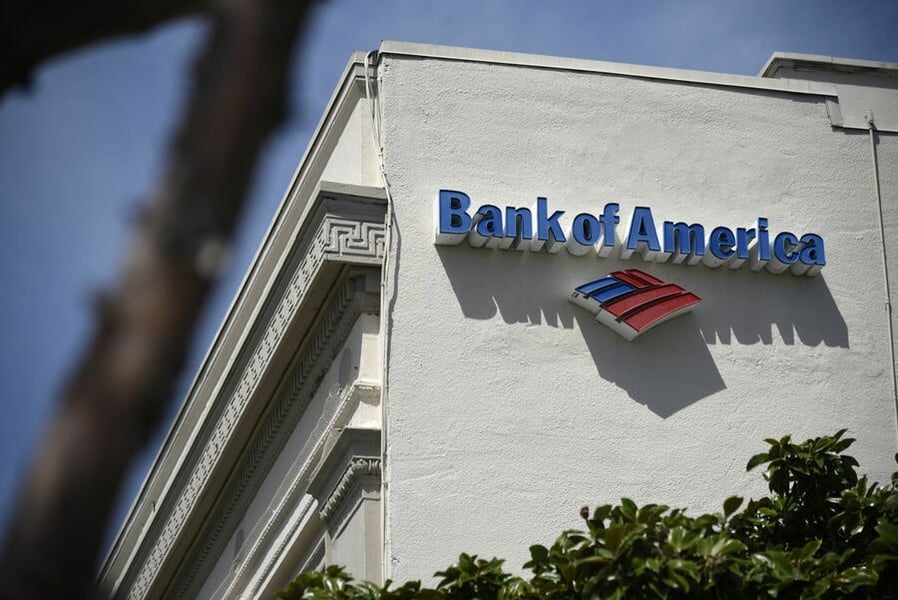

Bank of America Corp. reported its highest quarterly net interest income in at least a decade as the lender reaps the benefits of the Federal Reserve’s interest-rate hikes and debt traders beat analysts’ estimates.
Net interest income, a key source of revenue for the bank, rose 24% to $13.8 billion in the third quarter on higher rates and loan growth. Analysts had expected a roughly 23% increase for net interest income, which is the revenue the bank collects from loan payments minus what it pays depositors. Higher loan revenue combined with an increase in trading revenue helped earnings beat analysts’ expectations.
“We continued to see strong organic client growth across our businesses, with increased client activity helping to drive revenue up by 8%,” Chief Executive Brian Moynihan said in a statement Monday. “Our US consumer clients remained resilient with strong, although slower growing, spending levels and still maintained elevated deposit amounts.”
The results offer another look at how Wall Street fared through a choppy quarter marked by consumer strength, capital markets weakness and a gloomy economic outlook. Last week, JPMorgan Chase & Co., Morgan Stanley, Citigroup Inc. and Wells Fargo & Co. all posted gains in net interest income, with some raising their NII forecasts for the rest of the year.
Shares of Bank of America rose 4.6% to $33.16 at 9:37 a.m. in New York. They’ve fallen 26% this year, compared with a 23% decline for the KBW Bank Index.
The lender’s non-interest expenses rose 6% from a year earlier to $15.3 billion. Costs have been a focal point for investors this year after executives said they expect them to drop in future quarters. Bank of America expects full-year expenses to come in around $61 billion, slightly higher than the $60 billion it projected earlier in the year, CFO Alastair Borthwick said on a conference call with analysts.
The bank’s traders beat estimates, with bond trading revenue rising 27% to $2.55 billion and equity trading down 4% to $1.54 billion. The third quarter saw dramatic market swings tied to interest-rate hikes, surging inflation, recession fears and Russia’s war in Ukraine.
Investment banking revenue fell 46%, better than the 47% drop analysts were expecting, as the same market tumult that drove trading up also led to muted dealmaking. Fees for advising on mergers and acquisitions declined 34%, and revenue from equity and debt issuance dropped 76% and 34%, respectively.
Despite the slowdown, the bank isn’t planning any job reductions in its investment-banking division “at this stage,” Borthwick said.
The company’s loan balances rose to $1.03 trillion at the end of the third quarter, up 12% from a year earlier and slightly less than analysts’ estimates of roughly $1.04 trillion. Lending has been a key focus for investors, with government-stimulus payments undercutting borrowing by companies and consumers during the pandemic, and rising interest rates making loans costlier.
Also in Bank of America’s third-quarter results:
• Net income fell 7.9% to $7.08 billion, or 81 cents a share. Analysts expected 78 cents a share, the average analyst estimate in a Bloomberg survey.
• Companywide revenue rose 7.6% to $24.5 billion, more than analysts’ estimates of $23.6 billion.
• Bank of America increased provisions for credit losses to $898 million. That follows $523 million in the previous three months.
• Client balances in the Merrill Lynch Wealth Management business fell 13% to $2.71 trillion.

Blue Anchor Capital Management and Pickett also purchased “highly aggressive and volatile” securities, according to the order.

Reshuffle provides strong indication of where the regulator's priorities now lie.

Goldman Sachs Asset Management report reveals sharpened focus on annuities.

Ahead of Father's Day, InvestmentNews speaks with Andrew Crowell.

Cerulli research finds nearly two-thirds of active retirement plan participants are unadvised, opening a potential engagement opportunity.
Barely a decade old, registered index-linked annuities have quickly surged in popularity, thanks to their unique blend of protection and growth potential—an appealing option for investors looking to chart a steadier course through today’s choppy market waters, says Myles Lambert, Brighthouse Financial.
How intelliflo aims to solve advisors' top tech headaches—without sacrificing the personal touch clients crave
